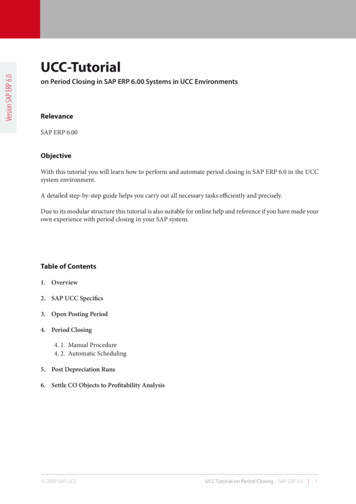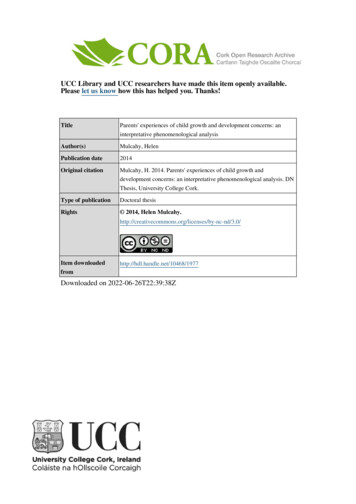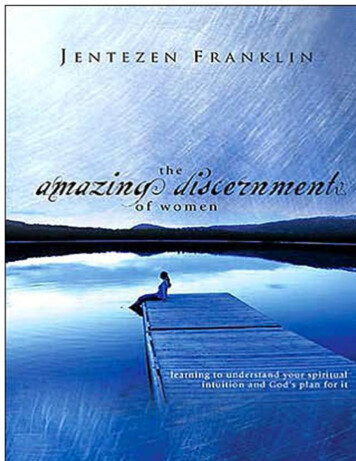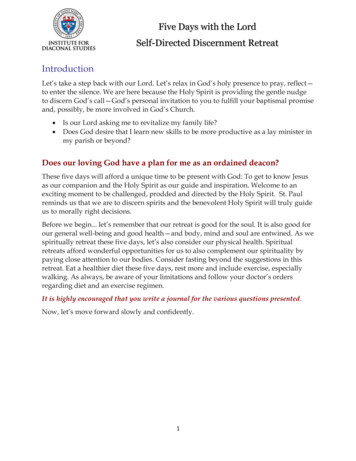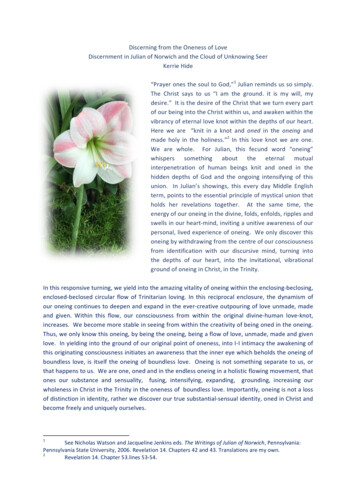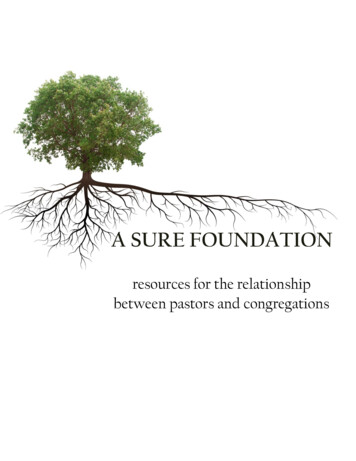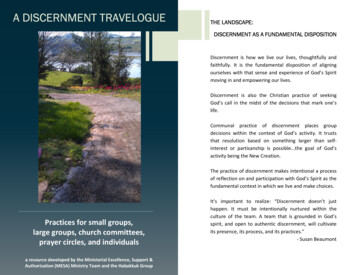
Transcription
A DISCERNMENT TRAVELOGUETHE LANDSCAPE:DISCERNMENT AS A FUNDAMENTAL DISPOSITIONDiscernment is how we live our lives, thoughtfully andfaithfully. It is the fundamental disposition of aligningourselves with that sense and experience of God’s Spiritmoving in and empowering our lives.Discernment is also the Christian practice of seekingGod’s call in the midst of the decisions that mark one’slife.Communal practice of discernment places groupdecisions within the context of God’s activity. It truststhat resolution based on something larger than selfinterest or partisanship is possible.the goal of God’sactivity being the New Creation.The practice of discernment makes intentional a processof reflection on and participation with God’s Spirit as thefundamental context in which we live and make choices.Practices for small groups,large groups, church committees,prayer circles, and individualsa resource developed by the Ministerial Excellence, Support &Authorization (MESA) Ministry Team and the Habakkuk GroupIt’s important to realize: “Discernment doesn’t justhappen. It must be intentionally nurtured within theculture of the team. A team that is grounded in God’sspirit, and open to authentic discernment, will cultivateits presence, its process, and its practices.”- Susan Beaumont
Our GPS for the discernment journey isGRACIOUSPRESENCE OF THESPIRITTHE ROADMAPWhile the basic roadmap for discernment has someelements in common RULES OF THE ROAD:1. Be fully present, extending and presuming welcometo/from others.2. Listen generously and suspend judgment aboutanother’s story. Hold stories with care and respect.3. Author your own story and share your own gifts.4. Wonder. Welcome discomfort. Love the questions.5. Be mindful and respectful of time.6. Practice hospitality and inclusion, especially whendiverse cultures meet. There are many excellent methodsfor discernment but not all of them model interculturalawareness, therefore be discerning about discernmentitself: appreciate many ways of hearing God together.7. Believe that it is possible to emerge from our timetogether refreshed, surprised, and less burdened thanwhen we came. it is grounded in prayer and scripture it is embodied and particular in persons, groupsand settings it honors human experience and tradition in theirwide diversity your particular roadmap for discernment will be uniqueand varied. Decide as an individual or group how you willoutline your roadmap, choosing one or more “modes oftransportation” and trust the Spirit as you begin to travelwithout knowing your destination.One roadmap for discernment might look like this: Begin with prayer, making space through bothsilence and words for the guidance of the Spirit. Name the question(s) to be discerned. Identifywhat is at stake and for whom. Listen for thequestion behind the questions.
Become open to the power of Scripture to tell ourstories and God’s stories. Engage in Lectio Divina. Ponder and discuss the intersections between thestory of the person in discernment, the story ofChrist and of Christ’s church, and the story of thefuture that is still unfolding. Enter into silence as needed (and often it is moreneeded than we imagine). Invite the guidance of the Spirit while reflecting:What are possible responses to the question indiscernment? Does the question need to bemodified? In which direction is God beckoning? Sit in silence with a possible answer. How does itresonate with or cause tension to your body andspirit? Know that waiting is an option if claritycannot be discerned. Decide on next steps. End with prayer.MODES OF TRANSPORTATION:TRANSPORTATION:SPIRITUAL PRACTICES FOR DISCERNMENTMEDITATIONpondering one word or phrase in our heartsSTUDYseeking resources to better understand a question andits possible options and/or impactsSUBMISSIONreleasing the need to get our own wayCONFESSIONexamining our thoughts, hearts and lives with humilityand with a determination to respond in new or fullerways to God’s directionSERVICEacting with ��sanother’sburdensburdensGUIDANCEtesting individual sense of direction (call) within a widercommunity, especially within the body of Christ
WAITINGWAITINGbreathing. taking in the sights, sounds, smells, thoughts,breathing.takingin waiting.the sights,sounds,payingsmells,attention.thoughts,and feelingswhilelistening.and feelings while waiting. listening. paying attention.LECTIO DIVINAreading scripture slowly and repeatedly, first listeningwith your heart’s ear for phrases or words that stand out,then reflecting on that word or phrase, reading yet againwith prayer, and then resting in silenceCLEARNESS COMMITTEEasking clear questions in the process of seeking clearanswers (from the Quaker tradition); such questions mayinclude: Is the sense of call from God or from some otherimpulse? How does this person ground her/his seeking? In what ways does the person feel already clear?What questions and concerns is s/he seeking toclarify? What are the potential benefits to the person'sspiritual development? What are the potentialbenefits to the wider community? What are thepotential benefits to the community of faith? Is the person prepared to undertake this ministryat this time? Does the person have the skills andresources to carry out this call? What are the risksand how will they be borne? How does thisministry or action fit into existing obligations suchas family, work, community, and related needs oftime and finances? Are additional steps of preparation requiredbefore moving forward in outward action?CELEBRATIONnaming, appreciating life’s joys as a source of strengthSHARING STORIESreflecting individually or in community: When do you feelclosest to God? When have you felt distant? When haveyou experienced God’s guidance? Have you experienceda time when God seemed to say “No” or when you said“No” to God? Tell a story about why you are convincedthat the Spirit is still moving in this world.DISCERNMENTARIANappointing one person in a group to listen and watch forthe Spirit during meetings. this person (or persons, if thegroup takes turns in the role) may interrupt the meetingto call for prayer, silence, storytelling, etc.ADDITIONAL SUGGESTIONSjournaling. painting. dreaming. spending time in nature.taking a long bath. walking. sipping tea. singing. talkingwith friends. seeking a spiritual director. being silent.
ARE WEWE THERE YET?WHEN DISCERNMENT LEADS TO DECISIONWhen discernment turns toward decision-making, ask:Are we ready? What are our next action steps? Who isresponsible for what, by when, and with accountability towhom? It may be helpful to restate the original question,to rename the stakeholders who will be impacted by thedecision, and to remember the presence of the Spirit.Understand that “No” can be the most faithful answer.PIT STOPS:STOPS:SUGGESTED BOOKS TO FUEL THE JOURNEYAwakened to a Calling: Reflections on the Vocation ofMinistry (Svennungsen and Wiginton, 2005)eight sermons on vocation serve as a resource forall who make and all who support those makingvocational decisionsThe Celebration of Discipline (Foster 1998)outlines twelve spiritual disciples that can lendthemselves to a disposition of discernmentGreenhouses of Hope (Baker, 2010)explores cultures and practices of congregationsthat inspire young people to explore theirvocations and the call to ministryListening Hearts: Discerning Call in Community (Farnham,Gill, McLean, and Ward, 1991)offers insight on the intersection of call,discernment and community – the three themesaround which the book is organizedTravelers on the Journey (Constantine, 2005)collection of interviews giving voice to theexperiences and wisdom of six pastors across theAmerican South who work on issues facing theircommunities
BLESSINGS FOR THE JOURNEYIndividual to group/committee/congregation:Thank you for witnessing to and listening for theHoly Spirit with me. I cannot do this work ofdiscernment alone, and I deeply appreciate thiscommunity for journeying with me. I commitmyself to strengthening my practices of prayer,study, and attention to the presence of God, sothat I might continue to learn how best towelcome the unknown in my life.Group/committee/congregation to individual:Thank you for sharing your stories, for witnessingto and listening for the Holy Spirit with us. Webelieve that the Spirit calls us together forcommon work and common good; thank you forincluding us in the work of discernment, becauseeach person’s path impacts the whole journey.We appreciate you. We commit ourselves tostrengthening our practices of prayer, study, andattention to the presence of God, so that wemight continue to learn how best to welcome theunknown in our individual and community life.
ourselves with that sense and experience of God's Spirit moving in and empowering our lives. Discernment is also the Christian practice of seeking God's call in the midst of the decisions that mark one's life. Communal practice of discernment places group decisions within the context of God's activity. It trusts
